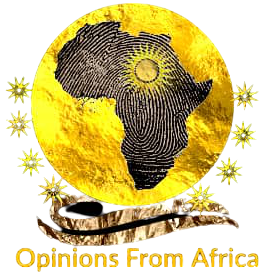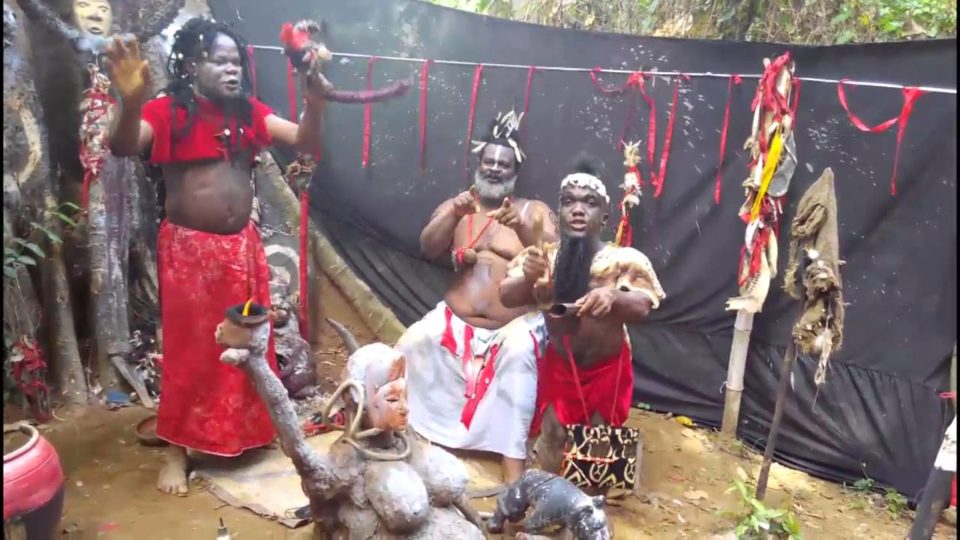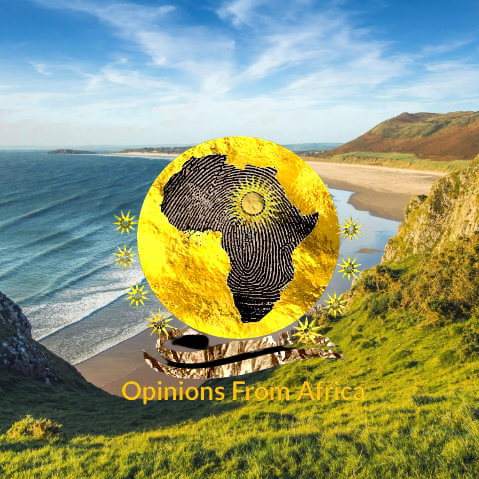There is this man in my village, dark with scary pair of red eyes, short, and solidly built. Popularly known as Owelle, he is a renowned dibia. Even in his late eighties, he still walks with a youthful gait. As a traditionalist, he has managed to remain indifferent to the increasing popularity of the Christian community in our village. He himself is not by any means insignificant. Owelle is revered by all including the followers of the white man’s religion who are awed by his native practices and lifestyle. However, the reverence is mostly born out fear of the man many perceive as the harbinger of all the atrocities in the village. The village gossipmill would always find a way to link him to ominous events ̶ the untimely deaths, strange illnesses, pussy meow cries and screeching noises on rooftops at midnights.
The foremost dibia is married to a woman who died while giving birth to her third child. The common rumour had it that he had used his witchcraft to kill his wife at child birth and sacrificed her to his strange gods. Even those who do not know the truth of this matter including neighbouring villages spread this with unwavering certitude.
To the left of the entrance of Owelle’s hut is a thatched shrine made of straw that looks odious. On strategic points of the shrine are straps of red cloth draping in style around its corners. At the leading entrance to the shrine are wooden splinters pegged to the ground; the clay floor marked with white chalk. At the interior are various kinds of totems sitting on the floor and scary looking masks hanging on the cracking mud walls.
Growing up, I knew a single story about Owelle. My mother would always warn me, “Never play with the children of Owelle, and whenever you see him on your way, never cross roads with him. Either return home or find another route.” I thought then of how bad this man must be that parents avoided him and persuaded their wards to do same. Once, I had asked my father about this same man. The picture he painted was however less sinister, “He doesn’t go to church. He has remained stiff-necked and would not convert into the Catholic faith. He is just a heathen.”
I digress. When Chimamanda Ngozi Adichie began her inquiry of real African identity, her first shot was to challenge stereotypical images of Africa that has become word porn for many Westerners. In a TED talk ‘The Danger of a Single Story’, she emphasizes how dangerous this stereotypical denigration of Africans by the West could be. She believes that the voyagers who read about, and visited Africa, while keeping a fascinating account of their navigation, were jaundiced in their view that they ended up writing incomplete and inauthentic stories. There are litanies of such jaundiced minstrels, including John Locke who sees Africans as ‘beasts who have no houses, people without heads, having their mouths and eyes in their breasts.’ For Rudyard Kipling, Africans are nothing but a ‘half devil, half child.’ The African race might have been latecomers to the global geopolitics, but as summarized by Adichie, “the problem with stereotypes is not that they are untrue, but that they are incomplete. They make one story become the only story.” So the renditions of such racists and culturists overlook the rich contributions of the African history and culture.
However, the result of this Afro-fashion is based in part on the stereotype of the image of the poor starving Africans in need of salvation by the West. The image has stuck as the only representation of Africans. This is quite not true because she believes there are other interesting stories that make Africans who they are and where they are going.
When I grew older, I decided to see things myself ̶ to learn about his other stories. One day, I courageously, albeit, with an overwhelming fear, ventured into Owelle’s place. As I took the unsure steps, my heart bit with trepidation at the uncertainty of what I might discover. I made to turn back, surprised at myself of ever thinking of such an adventure. But as I raised my eyes from my shaky feet, I saw his silhouette seated on a traditional ọkwa stool inside his shrine. It seemed his divine posture beckoned me and I saw myself drifting towards his presence. I could hear him muttering words I never understood, most probably incantations to his gods. “Bịa nwata a, were azụ wee batan’ime okwummụọ!’ I was jeered back to consciousness.
I made my way into the shrine with my back first, sat on the floor and tried to steady my gaze to his direction. He continued with his rituals as he made for some cowries from his leather bag. I heard him mention the four Igbo market days, dropping the cowries systematically to the floor. As he offered me kola, he called my father’s Igbo name and asked if I was his son. I simply nodded wondering how he came to know my father’s Igbo name, a name which has become victim to the church zealotry. He wanted to know if I was sent by my father.
With his growing friendly mien, I became more confident. ‘Nna anyị, my father did not send me on any errand. I have come to learn the traditions of my fathers. And where else could I get a richer tutelage?’ His eyes betrayed his delight at my curiosity. For the next two hours, it was history in its rawest form and I’d rather confess that from him I learnt what it means to be authentically African. He is simply a custodian of Igbo culture, far from all those sinister features attributed to him. He is just a sweet gentle soul.
I come from a little town known with rich culture and traditions, jealously guarded by a picket fence of taboos and abominations. From this great man I have learnt that culture prescribes and proscribes. It says ‘do not do this’ or ‘this is how you do this’. As part of the larger Igbo culture known for its dynamism, it is open to change and review by cabinet of the king and his chiefs. Our culture isn’t fetish. It is rather our unique identity.
So, when I think about African identity and of being authentically African, the image that comes to mind is the character of Okonkwo in Achebe’s ‘Things Fall Apart.’ This trailblazing novel came as a repudiation to Joseph Conrad’s ‘Heart of Darkness’ which was essentially about colonialism and the denigration of Africans which advertently portrayed the African character as one that is not fully human. Chinua Achebe, with a more benign poise as a literary maverick countered this notion by revealing the African identity through history.
The ‘Things Fall Apart’ story is beyond the well-known tragic tale of Okonkwo and the murder of that war booty lad, Ikemefuna. Both in style and plot, the novel has become a real African history book, narrating the story of the heroic ordeals of a real African man, Okonkwo, a man of courage, tradition and manliness. He sacrificed himself to the course of African purity.
The white man is very clever. He came quietly and peaceably with his religion. We were amused at his foolishness and allowed him to stay. Now he has won our brothers and our clan can no longer act like one. He has put a knife on the things that held us together and we have fallen apart.
Critics have described Okonkwo as a tragic figure. He might as well be, but staying to the course even to the end shows the undying African spirit. Though, not buried as a hero, his total rejection of colonialism offers this strong resistance that will shadow every form of imperialism throughout the African history.
Subjugation of any form is evil. It excommunicates the subject from their social milieu. What more when inflicted by a stranger who abhors the culture of the people. Igbo culture is lovely because it values personhood, community and consensus (Igwebụike) and hard work. The language and proverbs are beautiful and full of great wisdom. There is this character of every Igbo man that when I remember, it makes me feel proud- the character of resilience and enterprise. An Igbo man finds his way and adapts so easily to any new environment. And as some will say: “O nweghị ebe ndị Igbo anọghị.”
These are testimonies of the uniqueness of a people who have the right to coexist with every other human. And it is good that we are now boldly telling our story.
–John Chigbo Asomugha -2019




